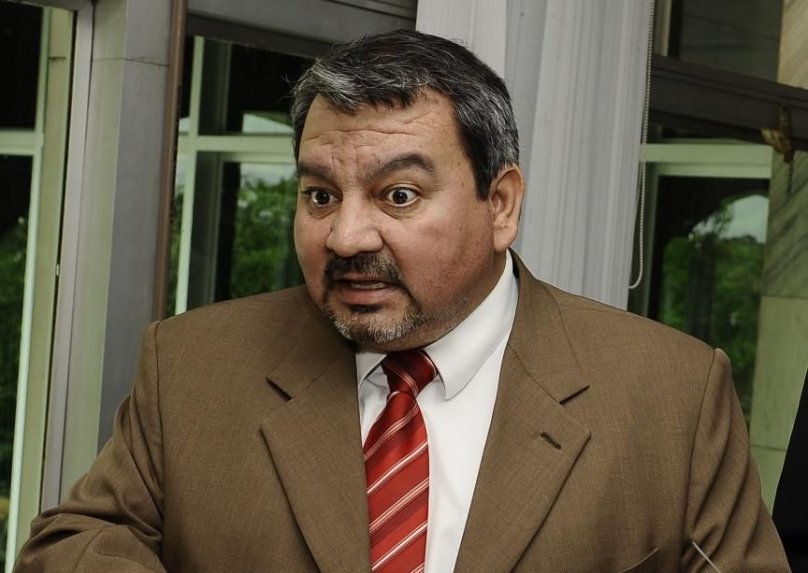Text messages exchanged between a congressman and a convicted criminal in Paraguay may be just the tip of the iceberg when it comes to ties between politicians and organized crime in the country, the largest producer of marijuana in South America.
Messages intercepted by police in 2011 and revealed by newspaper ABC Color paint a picture of the relationship between Congressman Bernardo Villalba, who had not yet been elected to office at the time, and Carlos Antonio Caballero, alias “Capilo,” allegedly a major drug supplier for Brazilian prison gang the First Capital Command (PCC). In the text messages, Villalba asks for campaign financing, mentions bribing a judge, and references a proposed law to keep drug traffickers from being extradited.
“Blue Label Johnnie Walker. A case of Perrier water and a case of Skol [beer]. That’s what it costs to suspend the hearing on the 17th,” reads one text message, in which Villalba refers to legal proceedings against Caballero.
According to ABC Color, three days after Villalba sent the text, the judge overseeing Caballero’s case suspended his preliminary hearing. In total, the legal proceedings against Caballero dragged on for close to five years and were suspended a total of 14 times. Caballero was finally sentenced to seven years in prison for money laundering, weapons violations, and illicit association.
In another text message, Villalba asked Caballero for a campaign contribution of $5,000 dollars, to which Caballero responded, “I’ll give it to you on Monday my friend.”
Additionally, the messages between Villalba and Caballero reportedly mention a law proposed by another Paraguayan congressman that would have kept Paraguayan drug traffickers and naturalized foreigners — like Caballero’s associate, a Brazilian — from being extradited.
The text messages also refer to “salmon” on several occasions, which appears to be some sort of code word. However, in an interview with the radio station 780 AM, Villalba claimed he was actually talking about eating salmon in the text conversations with Caballero. He also said the text message about bribing a judge with whiskey and Perrier water was a joke. Villalba added that he never received money from Caballero, and that his relationship with the alleged drug trafficker consisted of giving him legal advice.
ABC Color revealed the content of the text messages between Villalba and Caballero less than a week after Paraguay’s Senate presented a document describing ties between drug traffickers and public officials to the Attorney General’s Office. According to Terra, the accusations were based on a report by Paraguay’s anti-drug authority, known as the SENAD.
InSight Crime Analysis
Given Paraguay’s role as South America’s largest marijuana producer and the Senate’s accusations, Villalba’s case could be the first of many to expose collusion between criminal groups and high-level public officials.
The recent assassination of the ABC Color journalist Pablo Medina, who reported on drug trafficking for the newspaper, also suggested there are unsavory ties between Paraguayan government officials and organized crime. A local mayor is the primary suspect in the murder, which was allegedly carried out by the mayor’s brother and nephew. When police searched a property belonging to the mayor, they found hydraulic presses used to process marijuana and more than three tons of the drug. Meanwhile, a former governor has been accused of shielding the mayor from authorities and running a network that protects drug trafficking operations.
SEE ALSO: Coverage of Paraguay
Notably, the head of the SENAD, Luis Rojas, has recently been quite outspoken in denouncing narcopolitics in Paraguay. In a press conference on October 21, Rojas stated that drug traffickers pay politicians, military and judicial officials, and the media for protection.
It remains to be seen whether these recent events will escalate into a bigger, more serious probe into Paraguayan corruption. This may largely depend on the political will and the independence of bodies like the Senate and the Attorney General’s Office. It may also depend on the efforts of media organizations like ABC Color to continue shining a spotlight on the problem — despite the obvious dangers that its staff is facing.
SEE ALSO: Coverage of Elites and Organized Crime
This alleged collusion between drug traffickers and Paraguayan officials follows the pattern seen in other countries with a significant organized crime presence. This includes Mexico, where local governments and municipal police forces have been infiltrated by drug cartels, and Peru, where over 100 candidates for the 2014 regional elections were linked to drug trafficking cases.

